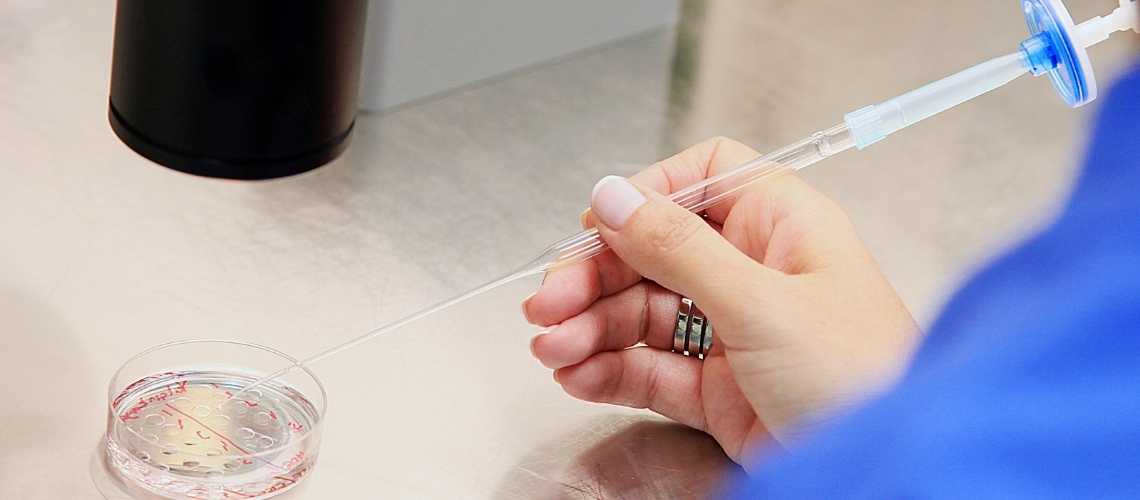Each patient reacts to treatments differently and may or may not feel slight pain. Physical discomfort is to be expected, and a qualified medical practitioner will be there to provide comfort and explanations along the route. Other forms of pain, like the emotional pain of a failed attempt, shouldn’t be taken lightly. However, it would be illogical to claim that there is no pain because successful IVF cycles frequently result in childbirth.
How is IVF done?
A large number of eggs must be retrieved for IVF treatment to be successful therefore ovulation medications need to be taken. These promote the release of more eggs compared to a typical natural cycle. The patient uses a needle to give the medications themselves.
Although many people fear injections, there is no reason to be afraid of them because the needles are so thin and the process is painless. If the patient can’t stand to watch any longer, they might ask a friend or partner to assist them, which might make the other person feel more involved. While uncomfortable, egg release shouldn’t be painful.
Bloating is one of the side effects, and while it may be unsettling when your favorite jeans suddenly stop fitting, if you are successful in getting pregnant, this will become unimportant. (1)
What are the other processes of IVF?
The eggs need to be recovered after being released. After eggs are extracted, cramps are common, although they are identical to the monthly menstrual cramps that most women experience starting around puberty. The patient will likely become accustomed to enduring these cramps.
Good remedies include taking paracetamol, unwinding by swimming or other sports, and utilizing a hot water bottle. Everybody has a different manner of coping with common illnesses, just as everybody is unique.
The procedure to put the fertilized eggs back into the womb may be the aspect of IVF treatment in Turkey that hurts the most. This test, which is performed a few days after egg retrieval, may resemble a smear test, but there is no need to be concerned. (2)
Is IVF Egg Retrieval Painful?
You don’t need to worry that the egg retrieval will cause you to experience excruciating agony. Most patients just feel a little discomfort. Cramping that resembles menstruation cramps may likely be the most painful thing you experience. The expansion of your ovaries may also cause you to experience fullness or pressure in the bladder.
Despite the relatively straightforward nature of the surgery, you could feel some slight discomfort after IVF egg retrievals, such as cramping and a sense of fullness or pressure. Additionally, you should give your body some time to relax and heal after the treatment. For roughly two weeks, we advise you to refrain from strenuous physical activity and sexual engagement. (3)
How do IVF patients experience pain?
A successful outcome in IVF means that the patient succeeds in getting pregnant and continues in having a healthy baby. While the IVF process will be covered in full above, pregnancy can result in a variety of unusual experiences, including possible pain.
Shoes and jewelry might become uncomfortable due to swollen hands and feet, and as the pregnant patient ages, it may become more challenging for her to perform her daily chores comfortably. These discomforts are quite typical and frequently a necessary component of pregnancy.
IVF is no different from any other medical process in that there is always a chance of experiencing pain. People react to situations differently, and discomfort might be one of the negative effects of ovulation treatments and other hormones. Patients who have had IVF indicate that the procedure is somewhat uncomfortable rather than painful.
What risks associated with IVF are women facing?
In vitro fertilization (IVF) is a technique for assisted reproduction where a man’s sperm and a woman’s eggs are mixed outside the body in a lab dish. It is uncommon for IVF treatments and procedures to cause serious problems. There are hazards, though, just as there are with all medical procedures. While IVF is generally considered safe, there are some risks associated with the procedure, particularly for women.
- IVF involves the use of hormones to stimulate the ovaries to produce multiple eggs. In some cases, this can cause the ovaries to become swollen and painful, leading to ovarian hyperstimulation syndrome or OHSS.
- IVF slightly increases the risk of ectopic pregnancy, which is when the embryo implants outside of the uterus, usually in the fallopian tubes.
- IVF increases the likelihood of multiple pregnancies if more than one embryo is transferred which can increase the risk of complications such as premature birth, low birth weight, and developmental problems for babies.
- The process of egg retrieval can cause bleeding or infection in rare cases.
- IVF can be emotionally stressful and can lead to depression or anxiety.
The vast majority of women who receive IVF do not experience these dangers, and the majority of IVF cycles end in a successful pregnancy, which is crucial to emphasize. Yet it’s critical for women thinking about IVF to be informed of any hazards and to talk to their doctor about them.
How can patients manage pain during IVF?
Managing discomfort during IVF treatment involves several strategies, ensuring the patient’s experience is as smooth as possible. Initially, the doctor might prescribe medications to alleviate pain, especially during egg retrieval. These medications are typically administered through an IV, offering significant relief. Furthermore, to minimize the sting of injections, applying a topical numbing cream becomes an essential step.
Additionally, embracing mind-body techniques plays a crucial role. Through relaxation methods such as deep breathing and meditation, individuals can effectively manage stress and discomfort associated with the procedures. These techniques not only aid in relaxation but also enhance the overall treatment experience.
Moreover, for addressing bloating and cramping that often follow egg retrieval, warm compresses prove beneficial. The warmth soothes the abdomen, easing discomfort considerably. Another complementary approach includes acupuncture. Studies have shown that acupuncture can be an effective form of pain management during IVF, offering patients an alternative to traditional pain relief methods.
- Medications through IV
- Topical numbing cream
- Deep breathing and meditation
- Warm compresses
- Acupuncture
Source:
Gejervall, A. L., Stener-Victorin, E., Cerne, A., Borg, K., & Bergh, C. (2007). Pain aspects in oocyte aspiration for IVF. Reproductive biomedicine online, 14(2), 184-190.








